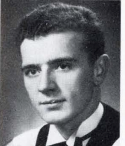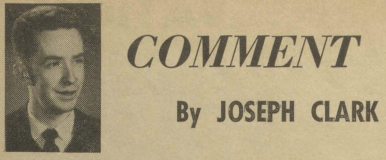
From the Archives: Politicians as Gazette Contributors
Write for us — you might become Prime Minister.
Election day inches ever closer. Last week, we looked at political visitors to our campus over the years. This week we’re continuing with the political theme.
You might not have realized it, but a number of very famous and successful Canadian politicians were Gazette staff members during their student years. This tradition extends at least as far back as RB Bennett (the 11th Prime Minister of Canada), who was one of our managers in the early 1890s. While we can’t tell which (if any) articles Bennett contributed — most content at that time was uncredited — we were able to find articles from the following political powerhouses, all of whom were once reliable Gazette contributors!
Gerald Regan: Premier of Nova Scotia, 1970-78

“The ‘Tigers” Den” – Jerry Regan – Volume 83, Issue 22 – January 16, 1951
Dal’s ice squad played two games last week. They played good, sound hockey and looked very promising in Thursday night’s game, but their performance on Saturday afternoon was woefully weak.
Strangely enough the Tigers lost the game in which they played good hockey and emerged with a 3-3 tie in their amateurish Saturday afternoon display.
Thursday night Dal lost a squeaker to St. Mary’s College on our ice by a 4-3 margin. This game between two evenly matched teams was one of the best this writer has seen in any league thus far this year. There were thrills packed into every minute of the game with Dal having more chances around the net but being unable to capitalize on them.
The contest was very rough throughout with fights a dime a dozen. The fistic highlight of the game was when Dave “One Punch” Jardine K.O.ed Bill Flynn with as nice a right cross as has ever been seen on the ice surface. Jardine thus earned himself a notch in the hall of fame for this was the first in human memory that a hockey player had been knocked cold by one punch while indulging in fisticuffs on the ice.
Another highlight was an impromptu comedy by a rangy Saint Mary’s defenceman named McLellan. This “defenceman” who was long on temper but short on ability continually went around waving his stick at the crowd in great wrath and convulsing his face into contortions that dearly showed that he would be a great hit in a stage play as Frankenstein, or maybe a scarecrow.
Joe Clark: 16th Prime Minister of Canada
“COMMENT” – JOSEPH CLARK – Volume 95, Issue 4 – October 24, 1962
On the night of June 18, Canada became aware of the Social Credit political party. Most Canadians consider the party – and specifically its volative “co-leader” Real Caouette – as more curious than significant.
It would pay to crack through the curtain of popular amusement at Social Credit, and look seriously at this starting political party.
The sustaining theory of Social Credit is too complex and obscure to permit examination here. In essence, it contends that there is not enough purchasing power, not enough money, circulating in Canada. The theory itself is really immaterial. What matters is the application and the appeal of that theory in the hands of the demagogues.
(…)
The birth of Social Credit could perhaps not have happened elsewhere but in the West. The extreme suffering the Depression brought Alberta, the prairie tradition of political non-conformity, and perhaps a Western weakness for salvationist evangelism, created conditions uniquely favourable to the assault of 1935. But, with birth accomplished, there is nothing inherently Western about Social Credit.
In the party’s own words, their supporters are people with “nothing to lose.” How many Canadian voters are dissatisfied enough that, with eloquent exhortation, they might believe they have “nothing to lose” by voting in untraditional fashion? In how many Maritime constituencies might there be enough such voters to elect an MP? In how many ridings in the nation? It is worth remembering that confident observers in 1935 thought Aberhart would fall in Alberta, in 1952 gave Bennett no more than four seats in B.C., and this year predicted Caouette would elect few more than himself.
Since the establishment of self-government, Canada has been served by politicians of generally high personal principles, and by parties guided by a broad political philosophy and by a genuine concern for the nation’s interest. There are some persons of high principal within Social Credit, Manning and Thompson are two notable, but it is difficult to determine the extent to which their principles command the party.
(…)
The “National interest” demands of Canadian politicians a capacity to co-operate and compromise. The dominant theme of our growth as a nation has been the welding together of various parts. Social
Credit has followed an exactly opposite path. Aberhart fulminated against “Fifty Big Shots” and “the East” and the “International conspiracy;” he generated a class war, and its difficult consequences persist. Bennett was elected to “best Socialism,” and he has constantly built up labour unions, the federal government and other “enemies” as straw dummies for “the people” tromped down by the “financiers,” and tromped down by “the English.”
Social Credit is the least responsible of the three splinter parties to achieve importance in Canadian federal politics, and is currently in a position of rising political strength. It is now strong enough to deserve more than scornful or mere curious attention.
Howard Epstein: MLA for Halifax Chebucto, 1998-2013
“Students “sacrificed” to appease to war gods” – Howard Epstein – Volume 98, Issue 13 – January 21, 1966
In the finest tradition of protest by the academic community, King’s students have sacrificed a companion to appease the war gods.
Shortly after nine Friday evening a select group gathered on the steps of King’s to witness the spectacle which was accompanied by the sounds of Barrie McGuire and his “Eve of Destruction”.
A procession of about a dozen mournfully wailing, sheet-clad sacrificial priests entered the King’s square carrying on their shoulders a large cardboard coffin. They placed the topless container upon an impressive snow altar which had been built in the middle of the square and adorned with the mystic symbols “MB”.
This sacrifice, one Bill Haye, attempted to arise but was suppressed by one of the priests who had climbed the altar to announce “the time for conciliation is gone.” He then drew a pistol and shot the brave Mr. Haye several times.
Thereupon, amidst wails of “Poor Bill,” the others ringed the coffin with paper and set fire to it.
When the sacrifice had almost been reduced to nothing but ashes the chief priest announced ‘The Middlists will save the world!” Our sacrifice has been accepted by the god of thunder.
With this heartening assurance of a Par Sacrificia, the ceremony was over.
To you, Mr. Haye, wherever you may be, the Gazette wishes to extend its thanks on behalf of the world.
Darrell Dexter – Premier of Nova Scotia, 2009-2013
“Birdy: ‘no fear of flying’” – Darrell Dexter – Volume 112, Issue 22 – March 13, 1980
Blrdy—William Wharton—Avon Books—$2.50—Paperback Edition.
Look at the sky. What do you find?
There ‘s everything there to strengthen your mind.
– Pepper Tree
William Wharton ‘s Birdy is destined to be one of the stunning novels of 1980.
The story of a boy, his friend and a fascination with birds leads into one of the most refreshing outlooks on life and the frustration with reality. Wharton captures the imagination and feelings of young people growing up in a world they do not understand.
Symbolism and the didactic purpose reign supreme in a genre that brings Birdy out of the abstract and into the life of people everywhere. His truths threaten the existences of purpose in our society. Wharton speculates: “we built this cage, civilization, because we think and now we have to think because we’re caught in our cage.”
Birdy teaches by learning along with the reader. We share the experiences of understanding and are left waiting for more. The impact of each new level of learning heightens the expectations of what is to come. We are never left waiting in the wings for more than a flash in time and the rewards are well worth the effort.
Birdy keeps coming toward the reader from beginning to end. Although it is set in a suburb of Philadelphia before World War II, it is filled with passions and needs of yesterday, today and tomorrow. Birdy takes time to read and requires the work of the reader and cooperation in understanding. It is a book that demands to be read regardless of preferred taste and demonstrates that a new understanding may well be one of the trade marks of the 1980’s. It is a book tor those that have no fear of flying.
High in the clouds far away from all
You get the feeling you can touch God.
Chasing the wind for as long as it blows
Seeing the world pass away down below.
– Pepper Tree







